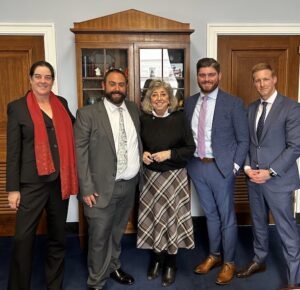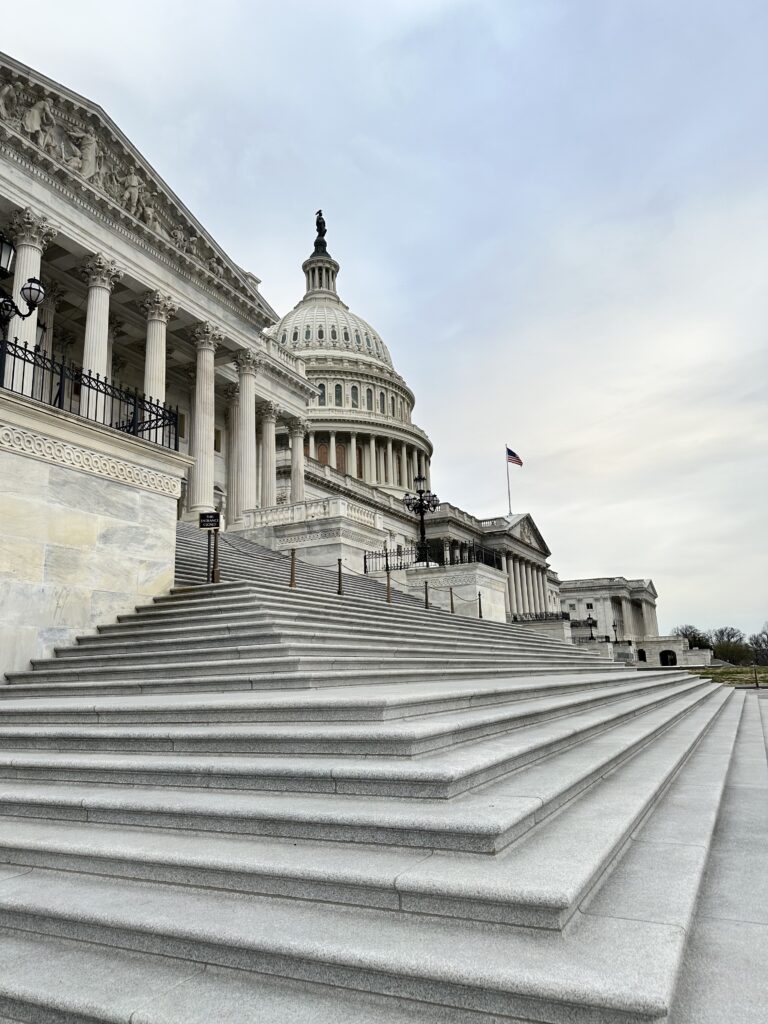
AUVSI recently their annual hill day, an opportunity for drone industry stakeholders to come together and meet face-to-face with policymakers. In this DRONELIFE Exclusive of his, we present the summary and points of one attendee.
Below is a guest post By CEO and Founder Matt Sloan skyfire consulting and Atlanta Drone Group. DRONELIFE DOES NOT ACCEPT OR DELIVER PAYMENTS FOR GUEST CONTRIBUTIONS.
Shipping from Capitol Hill
Walking down Washington DC’s First Street toward the marble US Capitol, past the Supreme Court and cherry blossom trees in full bloom.
Many of us think the work that builds the drone industry takes place in dusty parking lots and smoking fire sites. In fact, the actual work of building industry takes place in these hallowed halls.
Our technology is pretty good. Our will to do good continues to grow, but we cannot reach our full potential without the support of our regulators and lawmakers.
So I put on my suit (which is what I usually book for funerals and weddings), join an incredible team of like-minded drone pioneers, and spend the day in the halls of Congress. , talked about what was going well with lawmakers. What to watch in our industry.
We were invited by industry trade body AUVSI (The Association for Uncrewed Vehicle Systems International) to share the true story behind their daily lobbying efforts.
Yes, we were all thrilled that the Aviation Rulemaking Commission released a robust set of guidelines for Beyond Visual Line of Sight (BVLOS) operations in 2022. Amazon Prime Air is at my doorstep It’s the sort of thing that can be delivered early. But these proposed guidelines are unlikely to even begin the process of becoming a rule until spring 2024, two years after they were proposed.
When that happens, it will take at least two to three years of public comment, final rule development, and implementation to unlock the full potential of this industry.

Susan Roberts, Ondas Holdings Inc., Matt Sloane, Skyfire, Rep. Dina Titus (D-NV), Max Rosen, AUVSI, Michael Robbins, AUVSI
What do we do in the meantime? A subgroup of four like-minded companies (Skyfire, BRINC, WISPR Systems, Ondas Holdings) passes through the Capitol on the theme of using drones for public safety and operating drone first responders It was the biggest topic of conversation when I did.
With the FAA’s reauthorization set to expire in September 2023, legislators are working hard to glean legislative priorities from those in various sectors of aviation. And two weeks ago it was us.
So what did those priorities include?
First and foremost, the FAA will ensure that it adheres to the Spring 2024 deadline for the country’s proposed rulemaking on the Part 108 proposed rule.
In the meantime, it also includes finding pathways that enable certain low-risk/high-reward operations, such as those conducted by public safety agencies during emergencies. Leverages existing safety measures such as radar to enable more advanced operations.
Also included in the list was extending the life of Section 49 USC 44807. This empowers the FAA to “use a risk-based approach to determine whether a particular unmanned aerial system can safely operate in a national airspace system (NAS) on a case-by-case basis.” That section is scheduled to expire on September 30, 2023.
Next on the list is to support the competitiveness of the U.S. drone industry against industries in other countries, namely China, where the central government subsidizes the development of drone technology.
Finally, we spoke in depth with representatives of the legislative branch and their staff about how they will use existing funding, from the Department of Homeland Security and FEMA grant buckets to airport improvements and infrastructure programs. . .
Staff of Senators Ted Cruz (R-Texas) and Senators John Boozman (R-Arkansas). Rep. Michael McCall (R-Texas) and Mike Turner (Rep-Ohio); Rep. Dina Titus (D-Nevada) herself and her staff respectively to understand industry issues regarding the current situation Spent enough time. And pledged their office’s efforts to help break new ground.
Indeed, in a legislative environment dominated by partisanship, little can be done without a fight on the Capitol. These meetings are just a step in the right direction. But more importantly, it set the tone for these legislators. that is used to save lives today; and ask them to do everything possible to support it.
As a manned aircraft pilot myself, I understand the importance of controlling drone access to the National Airspace System. Safety is of utmost importance to all of us, but the longer we wait for common sense and replicable access to drones, the more tech-savvy smaller companies will go bankrupt and the business of regulation will go bankrupt. You will have to wait for it to catch up.
The longer we wait for the slow wheels of bureaucracy to spin, the more lives we have. could have climbs saved; and the U.S. drone industry lags further behind in innovation on the world stage.
We cannot afford to move the best and brightest companies, innovators, technologies and investments abroad because “regulation takes time”.
We thank AUVSI for their continued efforts to bring these issues to the forefront. And to encourage legislators and regulators to take a common-sense approach to enabling drones to do the important work they were made for.

Matt Sloan CEO and Founder of skyfire consulting and its parent company, Atlanta Drone GroupPrior to founding the Atlanta Drone Group in 2014, Matt spent 14 years at CNN in Atlanta in various roles. That included his role as Special Projects Manager for Medical News Producer and Chief Medical Correspondent Dr. Sanjay Gupta for 12 years. In addition to his work there, he worked as a certified emergency medical technician for his Emory EMS, working his way up to become the department’s resource and planning director. Matt is a founding member of the National Fire Protection Association (NFPA) Technical Committee on Drones, a Technical Advisor to the International Association of Fire Chiefs Technical Council, and an FAA certified pilot.
Miriam McNabb, editor-in-chief of DRONELIFE and CEO of professional drone services marketplace JobForDrones, is a fascinating observer of the emerging drone industry and drone regulatory environment. With her 3,000+ articles focused on the commercial drone space, Miriam is an international speaker and recognized figure in the industry. Miriam has a degree from the University of Chicago and high tech she has over 20 years of experience in sales and marketing new technologies.
For drone industry consulting or writing, please email Miriam.
twitter:@spaldingbarker
Subscribe to Drone Life here.
